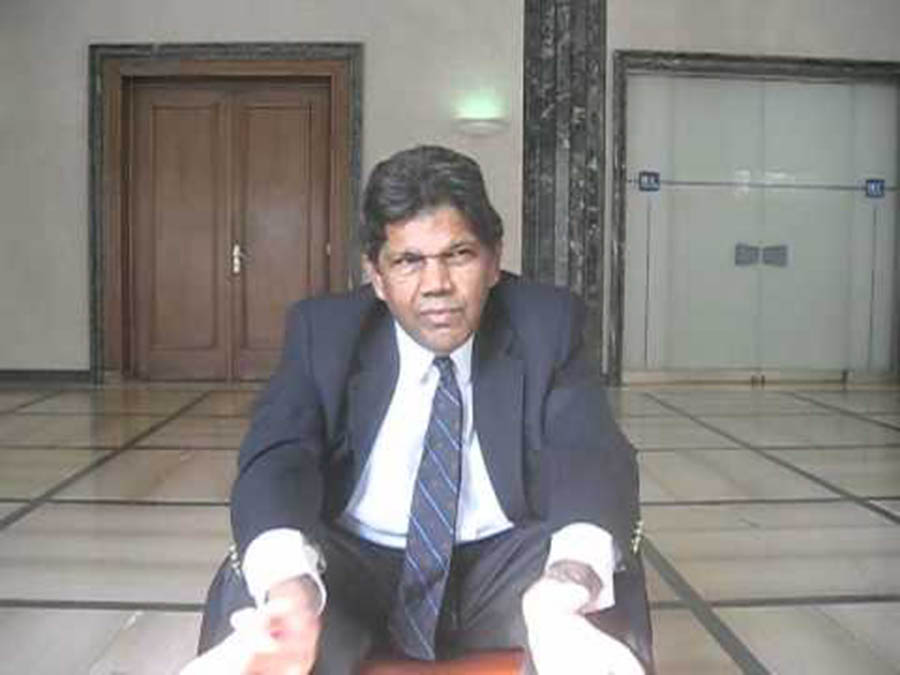By Dr Bertrand Ramcharan
Dr Bertrand Ramcharan is the Seventh Chancellor of the University of Guyana. He previously served as Professor of International Human Rights Law, Geneva Graduate Institute.
Young countries, especially those with diverse populations and troubled histories, need to work at nation-building and to assemble, and foster, unifying visions.
Unifying visions have been in short supply in Guyana, especially after the departure of national leaders of intellectual depth and stature, such as Bishop Randolph George and Cheddi Jagan. Guyana’s post-independence experience, except for the short period of the Presidency of Dr Jagan, has been one of ruling parties dancing to their own tunes, even as the rest of the country laments in sorrow.
The current period is no exception. There is little vision beyond slogans, little working together between government and opposition, and the current leadership of the country plants its flag euphorically in self-celebration of new infrastructural projects and initiatives, even as large swathes of the population undergo grinding poverty. Government and Opposition are as ships passing each other at the night.
A human rights framework, as we have argued in these pages, could have helped provide a unifying vision. But it would be fair to say that both of the main parties have a defensive and critical posture towards human rights advocates. Wiser leadership would have separated human rights ideas from their practitioners. But there is little evidence of this happening in the Dear Land.
One sees in the media claims and counter-claims about the historical experiences of different groups of the population, and their demands for the rectification of historical injustices – which have undoubtedly taken place in respect of all the major population groups in the country. The country needs a policy framework to help the different political formations and groups to negotiate equitable paths for a shared future.
United Nations Sustainable Development Goal 16 (SDG 16) offers a policy framework that can be of great value for a country such as Guyana. As one of the seventeen UN Sustainable Development Goals, SDG 16 enjoys broad consensus internationally as a Goal, even if its implementation has been halting in practice.
SDG 16 calls upon all countries to Promote peaceful and inclusive societies for sustainable development, provide access to justice for all and build effective, accountable and inclusive institutions at all level. Here is a neat policy agenda for Guyana. But where is the quality of the leadership, the intellect, the wisdom among the political classes to implement such an agenda.
The SDGs were adopted in 2015, and one would have expected the governments of the last two dispensations to have promoted a lively debate inside the country on ways of going about its implementation and on building up a national culture inspired by it. Alas, there has been none of this.
There is a shared responsibility here on the path of both Government and Opposition. Why is there no policy statement by either of the main parties on the centrality of SDG 16 in nation-building in the Dear Land? Why has there been no focused debate on the implementation of SDG 16 in Parliament?
There is much that is concrete and valuable in the guidance the UN has provided for the implementation of SDG 16 that could be of great benefit to Guyana. Since Guyana participated in the adoption of the SDGs, the guidance is of international, Caribbean, and Guyanese provenance.
Twelve targets were itemised when SDG 16 was adopted. We shall highlight some of these targets below, emphasizing those that seem urgent for Guyana.
The first target is to significantly reduce all forms of violence and related death rates everywhere.
The second target is to end abuse, exploitation, trafficking and all forms of violence against and torture of children.
The third target is to promote the rule of law at the national and international levels and to ensure equal access to justice for all.
The fourth target is to significantly reduce illicit financial and arms flows, strengthen the recovery and return of stolen assets, and combat all forms of organized crime.
The fifth target is to substantially reduce corruption and bribery in all their forms.
The sixth target is to develop accountable and transparent institutions at all levels.
The seventh target is to ensure responsive, inclusive, participatory and representative decision-making at all levels.
The eighth target is to broaden and strengthen the participation of developing countries in the institutions of global governance.
The ninth target is to provide legal identity for all, including birth registration, by 2030. Can one say that this is happening in the hinterlands?
The tenth target is to ensure public access to information and protect fundamental freedoms, in accordance with national legislation and international agreements.
The eleventh target is to strengthen relevant national institutions for building capacity at all levels, in particular in developing countries, to prevent violence and combat terrorism and crime.
The twelfth target is to promote and enforce non-discriminatory laws and policies for sustainable development. Given the contemporary debate in Guyana, one would have thought that this target would have been given particular attention in the Dear Land.
One needs to ask some simple questions: Who in Government should feel a responsibility for articulating policy statements for the implementation of these targets in Guyana? By the same token, why is the Opposition, which includes the major opposition party and other parties as well, not offering policy ideas for the implementation of these targets in Guyana?
Has the governance of Guyana, both on the part of the Government and the Opposition, degenerated into emptiness of intellect and policy when it comes to the application of ideas that can foster harmonious and equitable national development?
History will judge today’s crop of political ‘leaders’ harshly on how they measure up against these questions.









